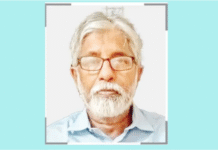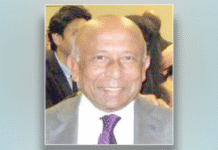
History shows that the strength of relations between states, particularly among neighbouring ones, lies in withstanding tests and, if done right, comes out looking better, both perceptively and in substance, in the end. The recent sudden and previously unannounced visit by Indian Foreign Secretary Harsh Vardhan Shringla to Dhaka needs to be seen in that context.
Understandably, the format of the visit has raised eyebrows among observers on both sides of the border. Traditionally, and in conventional diplomatic practice, such high-level visits are preceded by visible preparations and a formal announcement of the dates and other details of the visit. All of this was conspicuously missing in this particular instance.
That being said, if one were to focus on the substance of the visit and analyse it from available soundbites, its impact on the current state of our bilateral relations—especially in terms of taking it forward on the basis of mutual benefit and respect—was tangible.
In the prevailing global coronavirus situation, the issue of combatting this scourge through an effective and beneficial mechanism of collaboration between countries, using scientists and medical experts, has come to the fore. This is now a global phenomenon in which countries with known and perceived scientific and technical knowhow are rushing against time to come up with vaccines to prevent the spread of the virus and cure those infected. In fact, the word “vaccine diplomacy” has been firmly injected into the lexicon of global diplomacy, as the numbers of infections and deaths keep mounting exponentially.
Buy zoloft online
From his comments at a brief informal interaction with some Bangladeshi media personalities on Wednesday morning, the Indian foreign secretary, a person who is well-known here, indicated that he had delivered a message to Prime Minister Sheikh Hasina from her counterpart Narendra Modi—that on the issue of combatting Covid-19, India is not only going to stand by Bangladesh but, importantly, will also give priority to Bangladesh when it comes to getting access to the vaccine once it becomes available and is considered fit for use. He also reiterated this message while answering questions from the media after his meeting with his Bangladeshi counterpart in the afternoon. This is indeed reassuring to hear, as we continue to grapple for ways to save our people from this menace that still shows no sign of letting up. It is not known what else was discussed at the hour-long meeting at Ganabhaban.
Bangladesh Foreign Secretary Masud Bin Momen, in his comments to the media before his meeting with his Indian counterpart, had said that Bangladesh would explore all the avenues to get a quick access to a Covid-19 vaccine and choose the one that will be safer and useful for Bangladesh. “As part of discussions with others, we’ll discuss the issue (vaccine) with India. We should have all options and we’ll head for that one which’ll be safer and useful for us,” he had told reporters at the Ministry of Foreign Affairs the day before the meeting. The question that may follow from his comments is if he was pre-empting what Mr Shringla would be saying, indicating that Bangladesh would keep its options open and, wisely, not rely on one source only.
It is known that the King Edward Memorial (KEM) and Nair hospitals in Mumbai are all set to start Phase II/III clinical trials of the Oxford’s coronavirus vaccine candidate. This is backed by British-Swedish pharmaceutical AstraZeneca and will be launched under the brand name COVISHIELD in India. The vaccine candidate was formulated by researchers of Oxford’s Jenner Institute and developed in a record-breaking time of just three months. It is already in the last stages of clinical trials in Brazil, South Africa and the UK.
While “vaccine diplomacy” may have been a major thrust of the just-concluded visit by the Indian foreign secretary, given the history, nature and spread of bilateral relations between the two South Asian neighbours, it would be safe to assume that the visit was aimed to give greater boost to these relations. This was indicated in a statement from the Indian High Commission in Dhaka soon after his arrival on Tuesday, which said: “He is currently on a visit to Dhaka to discuss and take forward cooperation on matters of mutual interest.”
In comments to the media by the foreign secretary of Bangladesh, made after the bilateral discussions, he highlighted two issues that found prominence from Bangladesh: the killing of Bangladeshis on the border by BSF firing and an expectation from Bangladesh of a more positive role by India on the Rohingya repatriation issue at the United Nations, especially now that India is a non-permanent member of the UN Security Council. Apparently, on the former issue, a follow-up meeting between the relevant players of both sides is expected to be scheduled in the coming days. India also proposed the creation of an “Air bubble” to restart air travels between the two countries. There was, however, no mention of Teesta, or the sharing of any other common river. In a departure from traditions, there was no meeting between the Bangladesh foreign minister and the Indian foreign secretary.
Relations between neighbours are usually characterised by undulations in their form and content. The ties between Bangladesh and India are no exception. However, placed on a broader canvass, an upward curve in their relations is visible. The disbursement of India’s credit line, of which Bangladesh is the biggest recipient, has gained momentum. Recently, ten locomotives have been procured for Bangladesh Railway from India as a grant. Bilateral connectivity has also seen visible forward movement.
The visit of Foreign Secretary Harsh Vardhan Shringla, dramatic as it might have been, also had a great symbolic value. This was his first visit to any country in the era of Covid-19-enforced global travel restrictions. It was also well-timed, from an Indian perspective, coming as it did in the backdrop of misgivings among the people of Bangladesh because of certain domestic developments in India and a flurry of speculative and bizarre media activities—mostly emanating from India—touching on unfounded domestic issues in Bangladesh. Of late, sections of India’s civil society have been urging New Delhi to be conscious of the sensitivities in its most trusted ally in the neighbourhood. The foreign secretary’s visit would, whether by design or default, go a long way in addressing that.
Buy wellbutrin online
Shamsher M Chowdhury, BB, is a former foreign secretary of Bangladesh.









